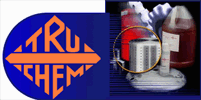

|
T.C. 170 |
||||||
|
||||||
 |
 |
|
| MISSION STATEMENT | HOME |
|
|
PRIMARY APPLICATION T.C. 170 is a liquid additive designed to improve the performance of primary cleaning solutions. It is suitable for use with acidic, alkaline or water-miscible solvent materials in spray washers or soak tanks. T.C. 170 helps remove difficult soils such as oils, grease, drawing compounds and shop soils that might normally require impractical and costly increases in time, temperature or concentration of the base material. A real energy saver, the material permits removal of difficult soils at reduced temperatures. T.C/ 170 is particularly useful as an additive to three-state T.C. 625-LW iron phosphating materials, substantially improving cleaning results. Non-silicated, non-phosphated, biodegradable, the material may also be used alone as a neutral cleaner in spray washing machines. CHEMICAL CHARACTERISTICS
APPLICATION PROCEDURE Concentrations, temperatures and exposure times will vary depending upon the type and degree of soils present. Generally, whether added to acid, alkaline or water- miscible solvent materials, in tanks or spray washers, or used alone in spray washer, T.C. 170 should be used between 1/2 to 4% by volume of the total cleaning solution. Recommended temperatures range from ambient in agitated tank installations to 120°F (49°C) or above in spray washer. NOTES ON USE When used alone, no special tank or coils are required. When used as an additive, the Primary material determines necessary equipment. Safety and Handling Precautions: T.C. 170 is an industrial detergent-cleaner additive. Direct contact causes irritation of eyes. Prolonged skin contact may cause irritation. May be harmful if swallowed. Do not get in eyes. Avoid prolonged skin contact. Wash thoroughly after handling. Do not take internally. First Aid In Case of Contact: For eyes, flush with plenty of water for at least 15 minutes; seek medical attention. For skin, flush with plenty of water. If swallowed, give several glasses of water to drink. Contact a physician. KEEP OUT OF REACH OF CHILDREN. DISPOSAL When used alone, no special treatment is required. Dilute and discharge according to federal, state and local regulations. When used as an additive, the primary material determines disposal treatment. PACKAGING Packaged in large, non-returnable poly-lined fiber drums. SHIPMENT May be shipped by any common carrier. Freight classification is "Cleaning Compound, NOIBN, Liquid". STORAGE Suitable for general indoor storage. Keep container closed when not in use.
|